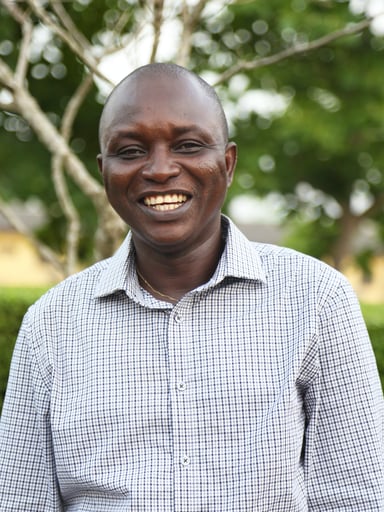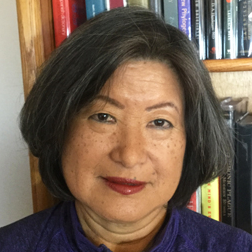Fears surrounding a shortage of personal protective equipment (PPE) at the height of the COVID-19 outbreak last spring hit home hard for May Chu, PhD, a clinical professor in the Colorado School of Public Health (ColoradoSPH).
As a microbiologist with the Centers for Disease Control and Prevention (CDC) sent to viral-stricken areas of West Africa in the 2000s, she had seen the devastation PPE shortages could cause, losing fellow providers and scores of patients to Lassa fever and the Ebola virus.
That’s when Chu, a top PPE researcher at the University of Colorado Anschutz Medical Campus, vowed to make a difference.

Many healthcare providers have lost their lives caring for patients due to improper personal protective equipment. That includes Humarr Khan, above, the Chief Medical Officer of the Lassa ward at Kenema General Hospital in Sierra Leone. Khan died of Ebola in 2014 at age 39. Photo credit: Pardis Sabeti, MD. |
Now, as COVID-19 ravages developing countries around the world, she thinks maybe she – along with a diverse group of scientists who joined her in a recent study – has found a way to prompt change.
Chu was a prime instigator behind a study published early online on May 21 in Infection Control & Hospital Epidemiology that confirmed an effective, inexpensive way to decontaminate PPE and halt the spread of highly transmissible coronaviruses.
Supply shortages spur collaborative study
Fueled by the PPE shortage last year that threatened hospital safety in this country and beyond, Chu found it easier than usual to find funding and institutional partners to study a simple method of disinfecting N95 respirators and medical masks.
Thirteen organizations, universities and laboratories around the world signed on, including the CDC and the World Health Organization (WHO).
Called the “Development of Methods for Mask and N95 Decontamination” (DeMaND) study, the researchers discovered that methylene blue, a chemical commonly found on clinic shelves even in developing countries, combined with light can be used to decontaminate N95 respirators and medical masks without compromising integrity.
Chu hopes the small breakthrough can make a big difference.
“Cheap and effective inactivation of SARS-CoV-2 on mask and respirators and its protective effects are ever more needed amid COVID-19 surges worldwide, such as in India, Nepal and Turkey,” Chu said. “This research could be a game-changer in its application for PPE reuse and as a preventive measure to kill the virus as it lands on surfaces.”
The study focused on three coronaviruses, including SARS-CoV-2, and tested the method on different models of masks and respirators. The light-activated methylene blue “robustly and consistently” inactivated all three coronaviruses with 99.8% to greater than 99.9% virus inactivation across all PPE tested, the researchers wrote.
The method required no special equipment – only a spray bottle and light – making it applicable in nearly any setting.
Worldwide pandemic brings problem home
In normal times in developed countries, hospital workers replace their masks between each patient, Chu said. “With COVID-19, shortages were so dire that doctors were issued one mask, and they had to wear it for the whole week.”
The Food and Drug Administration (FDA) called for quick disinfecting methods, with some options rapidly approved, including the frequently used vaporized hydrogen peroxide plus ozone (VHP+O3) decontamination method.
The overnight process costs $1.47 per mask and involves sending all providers’ masks to a chamber, generally in a trailer, each night for a week, Chu said. “Then the masks are delivered back to the original owner the next day, if you are lucky.”
With the DeMaND study method, providers keep and disinfect their own masks in fewer than 15 minutes for less than 3 cents per cleaning, she said.
Saving lives and the environment
All studies were conducted in multiple labs around the world with the same results. Parallel studies found the masks would maintain integrity and fit with five decontamination cycles, safely extending a one-time-use mask's life to five days.
“That means we have fewer masks to throw away,” Chu said. “These are made from petroleum products like those used in our bottle-type plastics, and they do not break down. We are dealing with 43 million tons of discarded PPE in a month around the world (since the pandemic’s outbreak).”
Methylene blue, a dye commonly used for microscopic staining and in other clinical applications, has been FDA-approved as an antimicrobial agent.
Researchers are continuing the study, looking at the method’s effectiveness on other common pathogens and on other materials, from gloves and gowns to hospital beds and surfaces.
'I don't want their deaths to be in vain'
For Chu, one of the biggest benefits of the newly proven method is that it can help devoted healthcare workers serving remote, low-income areas.
She recalled the close friends she lost in Africa who lacked PPE – including the chief doctor, who had dedicated 20 years to fighting Lassa fever in the area, and his head nurse, who “took me under her wing.”
“This is why I continue to work on PPE,” said Chu, who knows the COVID-19 pandemic has given her quest a needed (although unwelcome) boost, opening the eyes of the world to the seriousness of the issue. “I don’t want their deaths to be in vain.”
Photo at top: A trailer is lined with hundreds of masks awaiting disinfection. Courtesy of Battelle.


.png)
.jpg)
